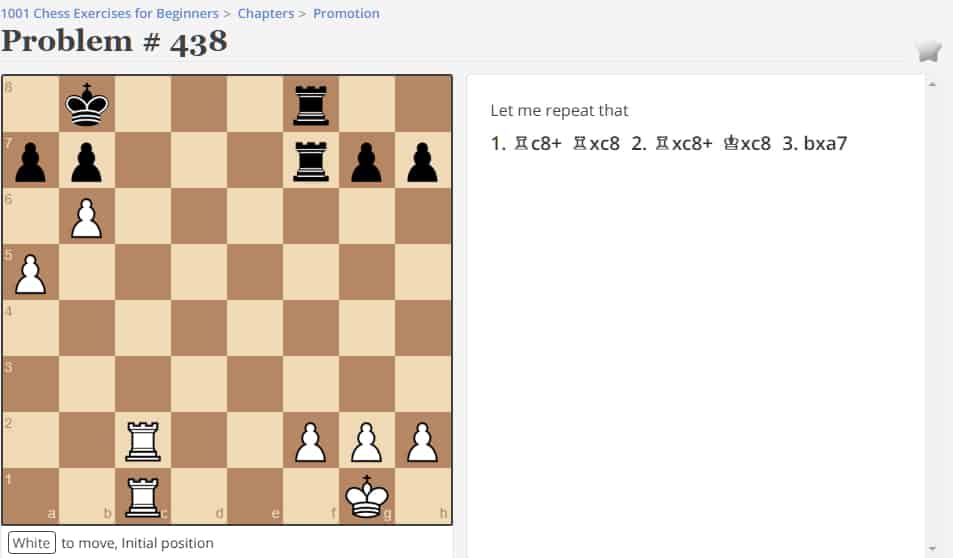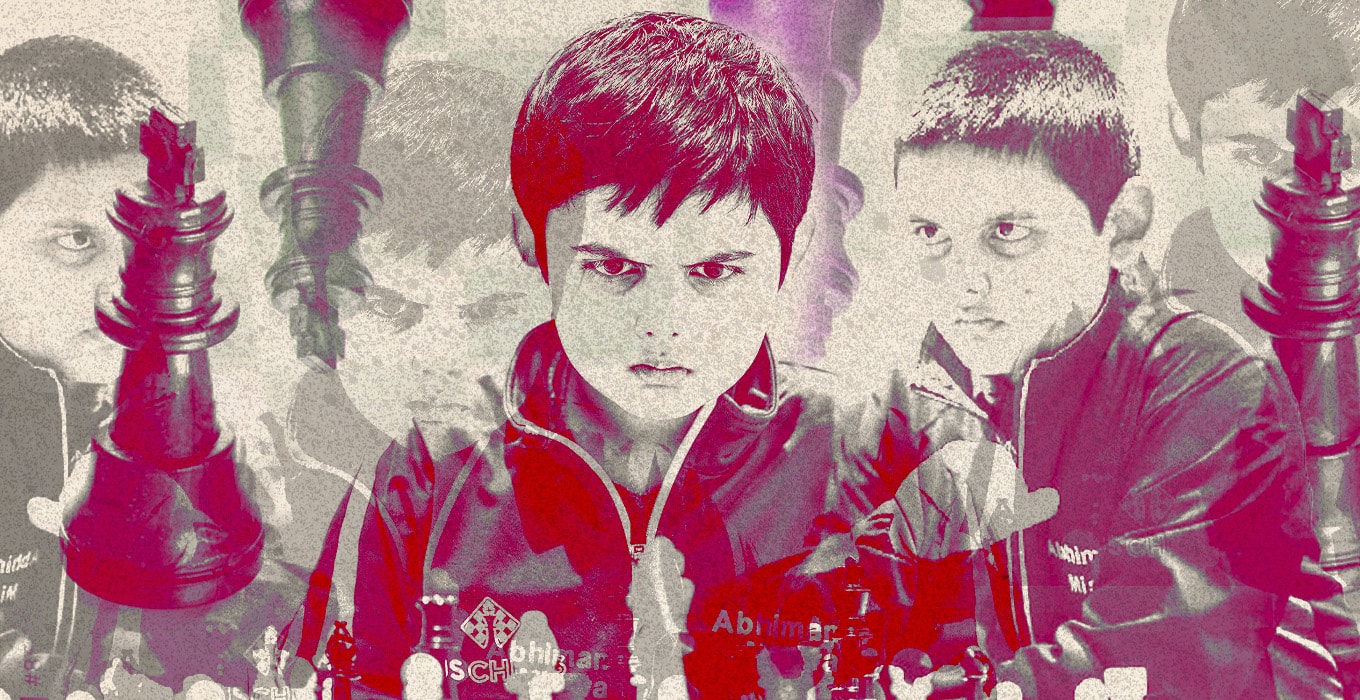After a 14-year break from chess, I decided to start playing again, only online at first, in November 2018. Recently, I played the Kidlington Chess Tournament, a well-established OTB event in the English weekend congress calendar.
Before that my last recorded official rating was way back in the year 2001 when I achieved my highest ever rating of 127 ECF, which converts to around 1650 ELO. But that rating was about to change – dramatically….
When I started playing on ICC I was shocked by how bad I was and how much I had forgotten! It took me until February 2019 before I broke 1700. I was so shocked by my play that I started looking around for ways to improve faster and in early December I joined Chessable.
Chessable gave me the tools to retrain my rusty brain and to learn new things that had been missing from my play. Not long after joining Chessable my rating began to climb!
I admit to having rather lofty goals; I am 49 years old, and I plan to be a FIDE Master. I try to study 2-4 hours every day, and a lot of that study is on Chessable. Chess is a very difficult subject to gauge progress, there are ups and downs, so it was with determination and hope that I entered the under 145 section of the 2020 Kidlington event on the weekend of February 1.
I felt that my strength had been increasing, so hoped it would be true and not just in my imagination! Happily, just over one year after joining Chessable, I scored 4.5 out of 5, winning a tournament for the first time in my life. Thank you Chessable!
I scored a tournament performance of 179 ECF = 2042 ELO.
What makes Chessable so different?
Chessable’s big draw is that it trains you by showing you positions over and over until they are memorized using spaced repetition. This is the case with openings, tactics, strategy and endgame and it works! In this article, I’d like to share some of the Chessable courses that have helped contribute to my improvement and some moments from my winning games.
Chess intuition is simply what we have deeply learned previously being served up by our subconscious. What I mean is that we remember subconsciously certain ideas and certain moves in familiar positions or fragments of positions. It is then up to positional evaluation and concrete calculation to determine if those moves and ideas stand up in the real world.
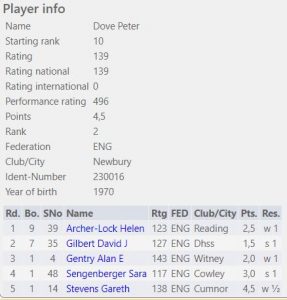
Chessable excels in building up our store of knowledge much more so that reading a book. You pick up a chess book, maybe read it once, maybe engage with some of the content and maybe nod your head at some of the ideas. However, at that point, the book goes on the shelf never to be read again. This is a poor model for learning. You will have forgotten a huge percentage of that material in a very short space of time.
You might get lucky in that you play a game soon afterward and happen to successfully deploy some nugget of knowledge from the book. If this lucky co-incidence happens then the knowledge maybe drops into your longer-term memory. However, you are likely to kiss goodbye to the rest of the material you had spent time reading.
Chessable’s biggest revelations
My tactics suck!
I spent a long time studying tactics as an adult at a complexity too high for my skill level. No one told me that I needed to get very basic tactics and mates embedded into my brain BEFORE I look at more complex tactics. This meant that I was forever struggling with tactics, always having to calculate everything and making little progress. I would also miss tactical shots of my own and fall foul of simple tactics used by my opponents.
Whilst looking for a way to solve my problem I saw a course on Chessable called 1001 Chess Exercises for Beginners. I bought it thinking that if it was too simple for me then I could always get a refund or give it to my 10-year-old son.
The book made a profound difference to my game and my ability to solve more complex tactics. Take the position below from the book – this is one from the section on pawn promotion.
To solve random tactics I sometimes go to Chess24.com or Chess.com. In one of those sessions, the following position came up. Using the simpler tactic above can you solve the position with black to move?
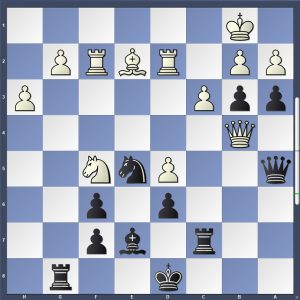
1.. Qxb4 2.cb Rc1+ 3.Kxc1 ba – when the pawn cannot be prevented from promoting.
After studying these simple tactics repeatedly, I am starting to see much more complicated ideas without the need for brute force calculation. The following position appeared in one of my games at Kidlington.
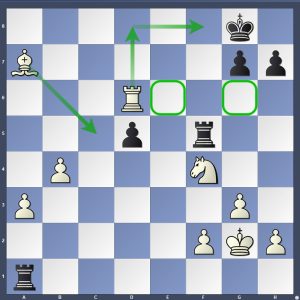
I had previously seen several mates in which the rook delivered a check from behind the enemy king with a pawn cutting off the side squares on the same file as the rook. In the above position, I saw all these possibilities and played Bc5 with the threat of Rd8+ and Rf8 mate. In this case the white knight did the job of cutting off the escape squares.
Only a few moves later in the same game the following position arose. Again I saw straight away a typical mating pattern of Knight on g6, pawn on h5 and Rook entering the back rank. All of these patterns coming straight from memorizing the simplest of mates and tactics.
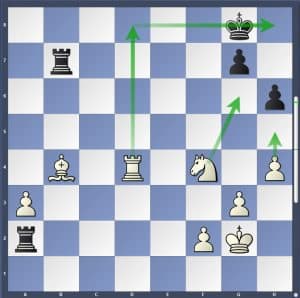
The game concluded: 39.Rd8+ kh7 40.h5 g5? 41.hxg6+ Kg7 42.Bc3#
I could go on with many examples of how much studying this one book has helped improve my ability to spot tactics but I fear this article is already going to be long! Learning tactics isn’t just about being able to spot tactical opportunities for making a quick ‘buck’; it is also about using tactical threats and ideas to help improve your position and assist in implementing strategical ideas.
My basic knowledge has more holes than Swiss cheese
How can I know what I didn’t know? In chess, this problem shows up when you look at positions and have no clue what to do. It shows up when you find yourself lost then relying on brute force calculation because no plans or ideas spring to mind.
It is easy to get disheartened especially when chess knowledge is so vast. What can we do? We can buy dense tomes on the endgame, or middlegame or openings and dive in. The trouble I find though is that improvement seems to take ages. You spend an awfully long time on one topic, gradually getting better, whilst all your other basic problems keep killing you in your OTB games.
Enter my most favorite series of books on the planet. These books consist of a complete course by Artur Yusupov. Artur Yusupov’s award-winning training course the Complete Series was Winner of the 2009 Boleslavsky Medal from FIDE (the World Chess Federation) as the best instructional chess books in the world (ahead of Garry Kasparov and Mark Dvoretsky in 2nd and 3rd place).
Chessable has the first two books available already with the other 7 coming in the near future. These books are masterpieces of step-by-step learning delivered via Chessable in a way which they will stay with you forever. The books cover tactics, positional play, strategy, the calculation of variations, the opening and the endgame all in bitesize chunks. You don’t get bogged down in too much detail, or too much focus on one topic. Yusupov fills in those knowledge holes that so typically occur with western training methods.
Every single topic covered is introduced through multiple example games/positions with explanatory text. Then you are presented with a test of 12 positions. Your task is to write down your solutions and calculations for each of the positions. You can then compare your analysis with the answer. Yusupov awards certain points for correct lines and solutions. You then add up the points you got for that chapter to determine whether you passed or failed. If you fail to get the right number of points Yusupov recommends you review the chapter again. The nice thing about Chessable is that review is built into the system!
Don’t take my word for it check out all the different topics covered in these two books.
https://www.chessable.com/the-fundamentals-1-build-up-your-chess/course/19145/
https://www.chessable.com/the-fundamentals-2-boost-your-chess/course/14534/
In this game from the tournament, Yusupov’s multiple examples of attacking weaknesses brought the move b3 to mind. The plan was that if black took on b3, after taking back with my a-pawn, I would have a nice diagonal for the bishop on a3.
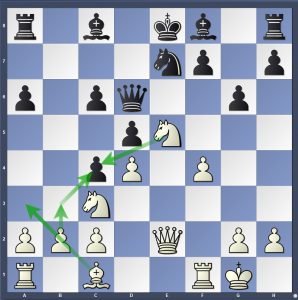
I did look at playing f5 but somehow missed that the pawn sac would allow me to play Bf4. Pawn sacrifices are something I haven’t yet looked at!
My thinking process – woollier than a sheep on a bad hair day
This became really clear in my OTB games, where I would miss tactics, fail to look at alternative moves and react without a clear plan in mind.
There are two important books on Chessable which did much to help fix my thinking process. They are both considered books for advanced and expert players, however, I found their advice to be easily explained and workable. The advice would really help players of all levels, however, the exercises in the book get tough rather quickly.
Grandmaster Preparation : Positional Play
This book helped a great deal by getting me to ask myself some basic questions about the position and helping me to attune my eye to more position elements. Aagaard explains his examples well in a way that should be accessible to a large range of players. This book focuses on positional play but not in the traditional sense. Instead of listing endless positional features the author provides you with three questions as a lens with which to analyze a position.
These three questions guide you to spot weaknesses, improve your worst placed pieces and also discern/disrupt your opponent plans. These questions, along with others, I have learned to bring into my play every move.
Grandmaster Preparation : Calculation
This book added some much structure to my thinking process around the topic of calculation. Again it is a book meant for more advanced players due to the complexity of the exercises however, each chapter starts off with simpler challenges and I find that the explanations of the thinking/calculation process will help players of all levels.
Summary
I could go on much longer about the many ways in which Chessable has helped improve my game however I’d be here writing all day! Suffice to say that Chessable helped get my first win in a tournament and makes me optimistic about the improvement possible.
After analyzing my games I realize that I can play a LOT better than I did, I still have some thinking mistakes based on discipline levels and there is a lot of basic holes still missing.
One thing I do know is that Chessable is going to help me fill in those missing holes AND make sure the knowledge gets memorized! Knowledge that is well memorized allows you to move faster, assess positions more quickly and reduce the amount of brute force calculation needed.


